Understanding Trump and Making Him an Ally
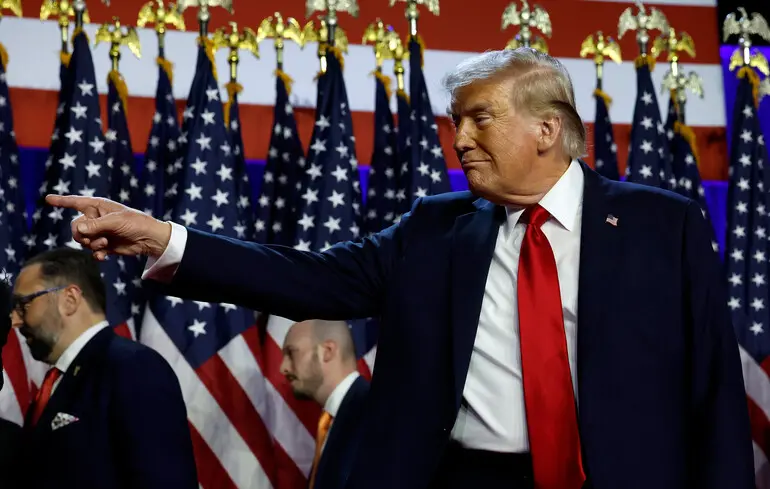
One of the most common adjectives used by the media to describe Donald Trump’s foreign policy is “unpredictable.”
However, Cambridge University professors Brendan Simms and Charlie Laderman in their book “Donald Trump: The Making of a World View” come to a clear conclusion: there is nothing sporadic about the decisions and judgments of the 45th president of the United States of America regarding international relations. It is worth noting that his beliefs were formed systematically and consistently starting in the 1970s and have undergone minimal changes to date.
“Most of the foreign policy themes associated with Donald Trump during the 2016 campaign were prominent three decades ago, with the possible exceptions of issues such as immigration and perhaps terrorism. […] Overall, there has been a remarkable consistency in Donald Trump’s foreign policy thinking over time.”
This may come as a surprise to most, especially to those Ukrainian writers and commentators who have characterized his public rhetoric as impulsive, eccentric, and reactionary. But the reality is that other studies of Donald Trump’s experiences, instincts, and beliefs, including those in Foreign Affairs, Brookings, the Financial Times, The Atlantic, the Washington Post, the Wall Street Journal, and elsewhere, have reached similar, if not identical, conclusions to Simms and Laderman.
When I reread the book by both of my former professors this summer, I couldn’t help but think about its relevance today, especially in the context of Ukraine, given President Trump’s return to the White House in 2025.
Thus, this article is an attempt to adapt these and other conclusions to modern realities and offer arguments in favor of the second administration of the President of the United States of America, Donald Trump, in the context of Ukraine.
In the morning — America, in the evening — Ukraine
The first thing that catches the eye in the materials of mainstream authors on the topic of Donald Trump’s foreign policy views, especially with reference to his caution towards the North Atlantic Treaty Organization (NATO) and the so-called transactional approach to international relations, is the conclusion that such views cannot be favorable for Ukraine.
In particular, this is often associated with the “America First” doctrine, which supposedly prioritizes quick, practical, and immediate solutions in favor of American interests instead of conceptual, ideological, and debatable solutions whose benefits are not obvious to the average American voter in the short term.
However, here, for starters, it would be worth delving into the nature of this doctrine, because with its correct understanding, one can find another, unexpectedly optimistic, perspective on what Donald Trump’s presidency could mean for Ukraine.
Thus, the “America First” doctrine is usually considered isolationist, that is, one that intends to isolate the United States of America from foreign policy processes and disproportionately prioritize domestic policy over foreign policy. In simple words, this is about the desire of the United States of America to simply "close up" on its continent, to focus as much as possible on domestic affairs and to significantly weaken its interest in everything that happens beyond the ocean, that is, such topics as the United Nations, the North Atlantic Treaty Organization, the European Union, the Middle East, etc. The exception is China as a player whose influence on the domestic affairs of the United States of America can no longer be ignored.
In fact, in Donald Trump's worldview, foreign policy and domestic problems of the United States of America are inextricably linked, but the economic aspect is at the heart of this connection, albeit from a rather unexpected perspective.
Thus, President Donald Trump’s main complaint about the foreign policy activities of previous White House administrations is the irrational spending of resources on what he calls state-building, that is, on helping other countries build a Western-style nation-state at home. Both Iraq and Afghanistan can serve as illustrative examples, where the United States of America, under different administrations, spent a lot of money and time on building secular liberal democracies. As we now know, all these efforts were fruitless.
Accordingly, Donald Trump rejects such “foreign state-building” as a whim of a few individuals that diverts resources from the economic reconstruction of the United States of America. In this context, “America First” is primarily about further abandoning the policy of such national development of other states at the expense of the United States of America and instead directing these resources as investments in security and infrastructure within the United States of America. In the broader context, “America First” is generally about the diminishing role of the United States of America in maintaining the existing liberal world order.
What is the point of the liberal world order here? Again, this may sound counterintuitive to some, but Donald Trump’s rebellion against this order is undoubtedly again based on economic factors. Donald Trump rejects the modern international liberal order because he is convinced that in the existing coordinate system, the United States of America is getting a bad deal not only from its enemies but, most importantly, from its friends. It is worth recalling that President Donald Trump is the author of a best-selling book called “The Art of the Deal.”
“People need egos, entire nations need egos. I think our country needs a bigger ego because it is being ripped off so badly by our so-called allies.”
This is where his theses that other countries should pay the United States of America properly come from, which you could hear in his public communication. Even in his youth, Donald Trump described the United States of America as a “second-rate economic power, a debtor country” to which other countries consider it possible not to give their due. That is, he described a country that does not have enough respect at the international level to change this. This is where the literal “obsession with respect” that determined the assessment of whether a particular country treats the United States of America with “due respect” as a key component of the worldview of the 45th President of the United States of America comes from.
These are the basic building blocks of the “America First” doctrine as interpreted by Donald Trump. Simms and Laderman confirm that while “America First” sounds isolationist, it is actually about: a) demanding greater accountability from allies and b) focusing the country’s leadership on concrete results instead of an endless process of cooking up a soup of amorphous values.
For Ukraine, this may mean that in its own communication with the United States of America, it will have to abandon the emphasis that has been customary for an entire generation on helping the United States of America build and strengthen democratic institutions and civil society here. After all, these are the components of the “overseas state-building” that the new White House administration would prefer to curtail.
On the other hand, it may also mean the onset of a long-awaited transition from expressions of “deep concerns,” endless balancing, and overly general policies to specific bilateral agreements that can yield faster and more effective results.
What we should definitely avoid, it seems, is positioning Ukraine as a young state and a weak economy that needs charitable assistance in nation-building and reconstruction.
Pragmatism without unnecessary formalities
Donald Trump’s worldview, undoubtedly based on pragmatism, often gives preference to concrete results over value-ideological constructs and campaigns.
Journalist George Beam, author of one of the bestsellers about Donald Trump’s worldview, notes that the long-standing skepticism of the 45th president of the United States of America regarding the duty of the United States of America to try to spread its liberal and democratic values around the world has been well documented.
Simms and Laderman support his opinion: in their opinion, few presidents of the United States of America have been so ready to publicly declare that the values of the American nation will play an insignificant role in the implementation of his administration’s foreign policy.
Through these lenses, we need to look at his previous and future communication with Putin, Kim Jong-un, and other individuals whom we may consider hostile to our values.
Another lens through which we can look at Donald Trump’s relations with other leaders is their competition with the United States of America in the economic field. The main problems of President Trump’s first term were economic, so he did not consider the Russian Federation as a serious competitor to America (because economically Russia is not a competitor to Washington). In contrast to China.
Accordingly, Donald Trump may sincerely respect certain qualities of Putin that resonate in his own character, but if Putin begins to seem to him an instrument of China’s economic strengthening, such respect may quickly end.
So, Donald Trump’s interpersonal relationships do not require common values. This is worth understanding and realizing the consequences of this.
This means that while the newly elected president may question traditional alliances, he is also open to strategic partnerships, but on condition that he perceives them as economically beneficial.
And if Ukraine can show itself as a valuable partner with unique proposals for regional security or for the growth of the United States economy (which is already happening at the expense of aid to Ukraine), there is a real chance that the Donald Trump administration will provide practical support, perhaps even more targeted and effective than under the previous White House administration.
As we can see, the issue of the economic interest of the United States of America constantly resonates in Donald Trump’s foreign policy decisions. And although the economy does occupy a central place in his vision, it alone cannot be called a decisive factor. President Donald Trump believes not in international, but in national capitalism, based primarily on domestic construction and production, and not on international trade and finance. In this regard, “Trumponomics” is a consistent program that involves the maximum concentration of resources at home, if it so happens that abroad they bring less benefit to the budget. But such categories as respect, image, and victory are also important for him. Therefore, pragmatism, which is often mistakenly perceived as isolationism, should probably be included among the decisive factors.
In general, it is worth noting that this idea that the 45th President of the United States of America is a purely isolationist is one of the most erroneous. Donald Trump, rather, seeks to reassess and adjust his country's relations, calibrate them in order to provide the United States of America with a clear and effective return in the near future in all possible categories.
And here the interests of the United States of America and Ukraine, again, may enter into a rather unexpected harmony. Understanding the pragmatic expectations of the new administration may open up the possibility for Ukraine to offer cooperation options that directly and practically meet the interests of the United States of America, for example, countering Russian disinformation, developing critical raw materials, including Ukrainian resources in the race with China in the field of artificial intelligence, etc.
The pragmatic nature of Donald Trump’s policy means that Ukraine is expected to make very clear proposals in the context of positioning itself as a key player in the broader strategy of the United States of America to create stability in Eastern Europe.
But above all, meeting the need for this stability for the United States of America.
Trophies belong to the winner
Many authors who have studied Donald Trump’s worldview emphasize a strong emphasis on sovereignty and self-sufficiency.
Although this has sometimes led to misunderstandings with allies, these categories resonate deeply with the situation in Ukraine. We are waging a protracted struggle to assert our sovereignty. It is worth noting that Donald Trump’s worldview naturally respects nations that are fighting for their own independence and self-respect. He sees life as a battle, but an endless struggle without a clear victory is unbearable for him. Thus, one of Donald Trump’s frequent reproaches to his predecessors was: “We don’t win anymore.”
Therefore, victory must be, but it must be total. This resonates with his favorite saying “to the victor — the spoils,” according to which victory is always a zero-sum game in which the winner takes everything.
President Donald Trump transfers this perception of reality as a struggle from business to the political sphere. This perception of reality declares a general demand for "rigidity" and claims that his personal philosophy is based on the perception of "life to some extent as a struggle", reflecting his Hobbesian view of international relations, which the world is in an anarchic state and force is of primary importance.
This gives grounds to say that Donald Trump properly assesses Ukraine’s resistance to Russian aggression. Not least because he often admires and considers strong those nations that act decisively in their own interests. This narrative fits Ukraine’s current position.
At the same time, such a significant emphasis on force is perceived primarily through the ability to defend one’s own national interest, and only then through its use as an instrument of global policy, as one might expect.
President Donald Trump has repeatedly stated in his interviews that, in his opinion, the United States of America should not be a world keeper and a world policeman. This is due to the argument already given above that he does not intend to engage in “foreign state-building”, as well as, again, purely economic reasons: the status of a world keeper and policeman is an inefficient expenditure.
They are ineffective primarily because of the disproportionate participation of European allies in financing the North Atlantic Treaty Organization, because the latter are in no hurry to fulfill their obligations to 2% of the Gross domestic product (GDP). And if someone thinks it is possible not to fulfill their obligation to you, it means you are weak. “You will see a lifestyle [of European countries] that is impossible to believe. They live like this because we give them their freedom, and they give us nothing in return.” “I believe that people should contribute, and other countries should contribute a lot, to this country [the United States of America] for what we do to preserve their freedom, and for them to be free, and to allow them to be free.” Ukrainians make this contribution every day at the highest price, namely, they sacrifice their lives, so it is not surprising that many consider this approach to international security to be “transactional.” But in some ways, this transactional approach of Donald Trump to the alliances of the United States of America in Europe and East Asia remains the most predictable aspect of his foreign policy.
The peacemaker
Not least because Donald Trump is first and foremost a pragmatist. His pragmatism could work in Ukraine’s favor: if he sees a clear benefit, he will act without hesitation, even if at times it may contradict established tradition or procedures.
Such a “no-compromise” mentality could mean that rather than being constrained by the multilateral bureaucracy that sometimes holds the North Atlantic Treaty Organization or the European Union back from decisive action, Trump might prefer more direct aid, security measures, or economic partnerships that have an immediate impact. The question is only on our part of the potential transaction.
Because right now, an underfunded and overburdened the North Atlantic Treaty Organization looks weak to Donald Trump.
And he historically draws a direct connection between external weakness and internal decline. This has always been part of his fundamental beliefs and is also a vital factor for his electoral appeal.
That is, Donald Trump's promises to end conflicts abroad are perceived by his electorate as his strength in the field of foreign policy. Because, firstly, this will be a step of the United States of America, and not of some alliance, that is, it is about the strength of American subjectivity, and, secondly, it will lead to the redirection of the above-mentioned inefficient expenses inside the United States of America, and this is about the personal benefit of an ordinary American from the end of some war abroad.
It is worth noting that this is a real end, the arrival of which truly deserves global recognition of his peacemaking efforts. Because, according to politicians who have personal experience of working with the 45th president of the United States of America, if there is any recognition that Donald Trump personally considers to be completely baseless, undeserved and opportunistic, it is the Nobel Peace Prize awarded to Barack Obama in 2009 of the year This happened only nine months into his presidency, when the grounds for such an award could not be identified even by the leading United States of America media such as The New York Times. This brings us back to Donald Trump’s previous argument about the “unfair deal”, which he does not tolerate.
The same politicians who spoke about Donald Trump’s attitude to this episode recall another one that took place in 2012. Then President Barack Obama publicly warned Bashar Assad against crossing the “red line,” namely the use of chemical weapons against the civilian population of Syria. When Assad crossed Obama’s “red line,” he failed to carry out his publicly stated threat. Donald Trump sees this not just as weakness, he sees it as a humiliation of the United States of America, so it’s easy to see why Barack Obama is one of the most controversial figures for the 45th president of the United States of America.
These two facts shed light on Donald Trump’s ambition to end Russia’s war in Ukraine, but to do it effectively, in contrast to Barack Obama, to rightfully gain the status of a true peacemaker and thereby elevate the United States of America on the world stage.
This is his other ambition, probably even more fundamental, which will determine the course of his entire second term, namely his legacy. Every president asks himself the question of what his descendants will remember him for and what will be written about him in the history books. Donald Trump's opponents did everything possible to ensure that the legacy of his first term was January 6, 2021, that is, the storming of the United States Capitol. The second term is an open invitation for the future 47th president of the United States of America to write his own history and determine what his final legacy will be in the memory of not only Americans, but also the entire world.
Legacy is a category stronger than any transactional activity.
A different world policy
Therefore, although Donald Trump's past relations with international institutions and Europe were not simple, his worldview should not be perceived as the opposite of supporting Ukraine. The point is that he simply has different conditions.
Using the example of the same North Atlantic Treaty Organization, we can conclude that the main condition is not so much a mutually beneficial defense alliance, but the receipt of financial compensation by the United States of America from its allies in exchange for their protection. Some would call such a condition “transactional,” but it is simply a different approach to international relations, to which our society has yet to get used.
After all, until now, pragmatic foreign policy has always hidden behind a facade of pompous declarations and disguised itself with ideology and values, which often had little in common with real actions. Over the three years of war, we have learned this well.
Donald Trump, on the other hand, would prefer, in his own words, that the United States of America “stop exercising general supervision over the protection of democracy and human rights.” That is, for him, common values are far from a priority, just like a common lifestyle, and he is ready to call things as they really are.
So, it looks like we’ll have to find new language that resonates with the new White House chief, and more importantly, something he can respect, something he’s willing to fight for.
What really deserves special attention is not so much the fact that the new administration's approach to diplomacy is "transactional" (all political relations are, in the end, just like that), but that such an approach creates a rather short-term and narrow view of the processes, preferring of quick profit over long-term shareholder value.
This is consistent with the disdain for “overseas state-building” and the secondary place of ideology in foreign policy, since this approach is not focused on long-term strategy but rather on the immediate demonstration of unquestionable deal-making skills.
It is quite likely that for the same reason, President Trump has his own, different, attitude towards the United Nations, formulated by him during the 2016 campaign as “the United Nations is not a friend of freedom”. But I repeat, it is important to realize this paradigm shift and learn to use it to your advantage. Specifically in the case of the United Nations, perhaps this is a chance to gain an unexpected ally in rebooting the organization and finally expelling the Russian Federation from it.
Finally, it is worth mentioning that one of the famous American political scientists, Walter Mead, defined President Donald Trump as a “Jacksonian” in honor of the seventh President of the United States of America, Andrew Jackson. This category of politicians, according to Mead, has little interest in spreading democratic or capitalist values around the world. Instead, such politicians prioritize domestic politics, with a special emphasis on economic problems.
In this sense, Donald Trump’s priorities are truly Jacksonian, he is focused on protecting American jobs in their home country on restrictive trade policies abroad, on a tough fight against terrorism, on combating torture, on increasing military spending, and on getting fair compensation from other countries for defending the United States of America.
According to Walter Mead, it is also crucial that “Jacksonians” generally care little about foreign affairs unless someone directly threatens the United States of America.
In such cases, supporters of Andrew Jackson’s policies react as harshly and massively as possible, with overwhelming force, without much regard for any legal conventions or limitations, and with utter contempt for those who wish to respond proportionately or limitedly to a threat to the homeland.
If we take as our main guideline the assertions of Simms, Laderman, Beam, and others that Donald Trump’s domestic and foreign policy worldview was fully formed even before he took office as president of the United States of America, then it looks as if this worldview does indeed have the hallmarks of a Jacksonian one.
For us, this means that if Ukraine approaches Donald Trump’s second presidency pragmatically, positioning itself as a key independent partner rather than as part of the traditional Western bloc, it may find in Donald Trump an ally who values results over formal alliances.
With his second term as president of the White House, Ukraine will have the opportunity to present itself as a willing and capable partner who shares the goals of the United States of America while preserving its own identity and independence. In a certain sense and under certain conditions, Ukraine's steadfast struggle against the aggression of the Russian Federation cannot but arouse sympathy and respect in Donald Trump, who admires success stories achieved through one's own efforts and the strength of one's own character.
No matter what, the "Ukrainian character" is already known to the whole world, and it is the character of a fighter.
Please select it with the mouse and press Ctrl+Enter or Submit a bug











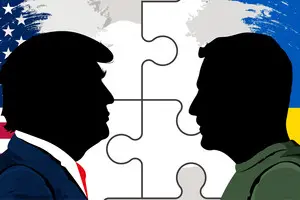
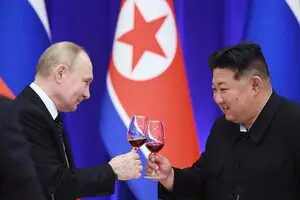
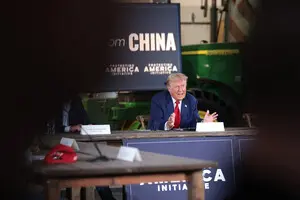
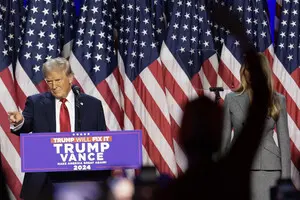
 Login with Google
Login with Google